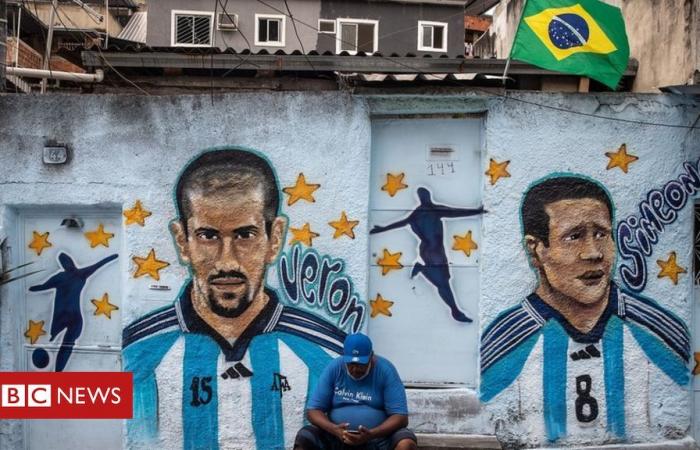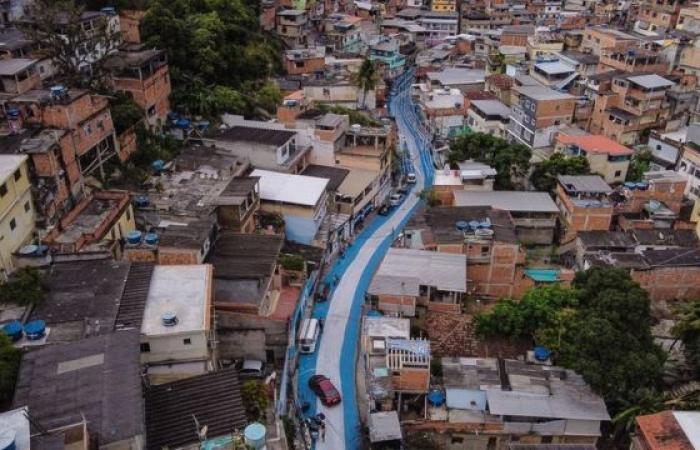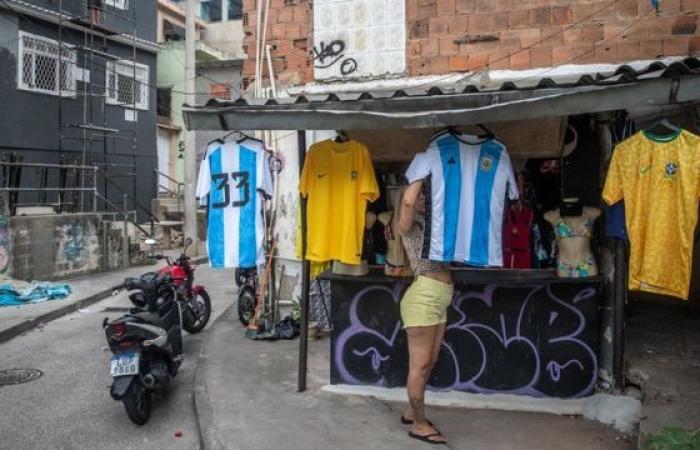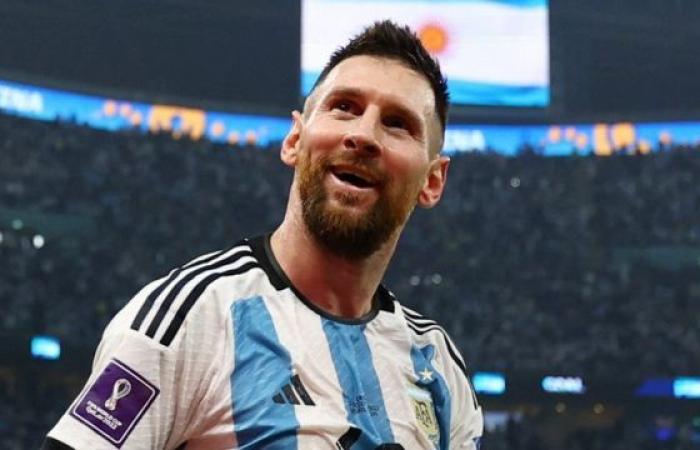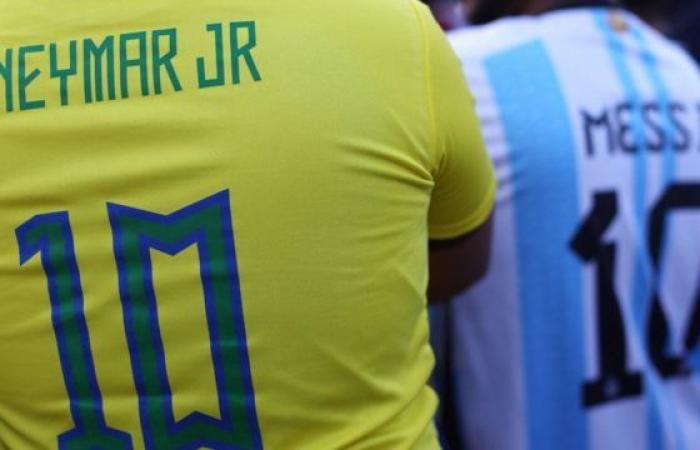- Marcia Carmo
- From Buenos Aires to BBC News Brazil
December 17, 2022
Credit, ANDRE COELHO/EPA-EFE/REX/Shutterstock
Streets and walls of Morro do Dendê, in Rio de Janeiro (RJ), were painted in honor of the Argentine national team during the 2022 World Cup
As soon as the Argentine team eliminated the Netherlands in the World Cup in Qatar, on December 9, some Brazilian fans sent messages to Brazilian and Argentine friends who live in Buenos Aires celebrating the result.
“What a game, what a beautiful crowd. Congratulations, brothers”, said one of them.
On Tuesday (12/13), when Argentina beat Croatia by three to zero, new messages, in tones of admiration, were repeated again. And some of them even included tango snippets.
“Art and fight in equal doses”, wrote one of them, praising the performance of the team led by Lionel Messi and attaching a tango by Astor Piazzolla to the message.
With Brazil leaving the Cup, some famous and anonymous Brazilians joined the support for the Argentine national team — including the narrator Galvão Bueno, from Rede Globo, known for having said that “winning is good, but winning against Argentina is even better”.
Even the correspondent of the British newspaper The Guardian in Latin America, Tom Phillips, was surprised by the support of Brazilians for the selection of the neighboring country. “What’s going on?” he joked on Twitter.
Is something changing in the historic rivalry between Brazil and Argentina, fueled by World Cup disputes and decades of comparison between the performance of Maradona and Pelé?
To understand this, BBC News Brasil heard analysts specialized in history, anthropology and football, who observed that this current feeling reflects several reasons.
Admiration for Messi, who collects seven Ballon d’Or awards for the best player in the world and is often praised for his “simplicity” and “zero arrogance”, “the determination of the players and the Argentine fans” and the perception of the new generations of Brazilians, who identify themselves as Latin Americans are elements that contribute to appease the historical rivalry.
Professor João Manuel Casquinha, from the Department of History at the Federal University of Santa Maria (UFSM), who conducts research on football, attended the BBC News Brasil report when he had just left a meeting with two other professors. The three scholars are rooting for the Argentina national team, which this Sunday (12/18) will play in the World Cup final against France.
“I’m going to give a fan’s perception. Argentine players have always enchanted us with their dedication, their love for their country. That thing of playing for the flag and finishing games and going to the crowd. A lot of determination, a lot of vibrancy. And, in addition to all the Argentinian grit, they have the best player in the world and we end up feeling a little jealous in Brazil”, said Casquinha.
Coordinator of the Study Group on the History of Sport and Playful Practices (Stadium), the professor understands that even video games have contributed to the new Brazilian supporters for Messi.
“We see younger people who like Messi, who saw him play for Barcelona, see him play for Paris Saint Gemain and spent four years (until the Cup) playing with ‘Messi’ in the video game. And they end up having as much identity with Messi as they have with Neymar. I would say that, in some cases, they even have more identity with Messi than with most Brazilian players, who they don’t always know because they play in smaller European teams and practically don’t play in Brazilian territory”, he said. Cone.
Credit, ANDRE COELHO/EPA-EFE/REX/Shutterstock
Is something changing in the historical rivalry between Brazil and Argentina? In the photo, street painted with the colors of the neighboring country in Dendê
“We have a new generation of fans who support Arsenal, Manchester City, Paris Saint Germain, Barcelona… It’s a phenomenon that we see happening in South American countries. It has to do with globalization. And these clubs have been working on insertion in Latin America,” he said.
This same generation identifies itself, in many cases, more as Latin American, contrary to what their parents and grandparents thought in the past. This feeling also explains the support of many Brazilians, in Professor Casquinha’s view — he himself says he wants “a victory for the South Americans” this Sunday.
Argentina coach Lionel Scaloni has also tried to cultivate this.
Scaloni is friends with several Brazilian players, declares himself a “fan” of Brazil and said that it would be “stimulating” to have the support of Brazilian fans and other South American nations in the final — since 2006, Europeans are the only ones to lift the World Cup Cup.
But, to put the feud aside, it is necessary to understand its origins.
The Origin of the Brazil vs Argentina Rivalry
It is in politics, and not in football, that some historians locate this principle.
Historian Boris Fausto, co-author of Brazil and Argentina: An Essay in Comparative History (1850-2002)says that the feud began in the 19th century, when the two countries began to dispute regional leadership in South America.
For Fausto, this political rivalry ended up being assimilated by society. And, with that, it detached itself from historical facts and invaded other sectors, such as football.
The Argentine political scientist Rosendo Fraga also thinks that Brazil and Argentina inherited the rivalry that existed between the former colonizers, Portugal and Spain, in the process of occupying South America. And in this, the dispute over the region called Cisplatina, on the outskirts of the River Plate, plays an important role.

Credit, ANDRE COELHO/EPA-EFE/REX/Shutterstock
For Boris Fausto, the political rivalry between the countries, which started in the 19th century, ended up invading other sectors, such as football
This dispute reached its climax in the Cisplatine War (1825-28), which opposed Brazil, already independent from Portugal, and the so-called United Provinces of the River Plate, which would later form Argentina.
Brazil suffered severe defeats in three battles of the war and ended up giving up ownership of the territory. The Argentines also did not stay with Cisplatina, which ended up becoming another country: Uruguay.
But bilateral distrust continued, despite the lack of hostilities or conflicts thereafter. Even Brazil, Argentina and Uruguay were allies in the Paraguayan War (1864-1870).
Argentine political scientist Vicente Palermo, author of La Alegria y la Pasión – Brazilian and Argentinian Reports in Comparative Perspective (“Alegria e a Paixão – Relatos Brasileiros e Argentinos em Perspectiva Comparada”, in free translation) thinks that, historically, it was common for Argentines to display an air of superiority towards Brazilians. This is because of the historical period in which Argentina was one of the richest countries in the world in terms of GDP per capita, with a stronger middle class.
But he thinks that this changed mainly after the military dictatorship installed in the country between 1976 and 1983, when Argentines found themselves facing similar or even more serious problems than Brazilians, such as the succession of economic crises.
Today, Vicente Palermo thinks that Argentines have completely changed their view of Brazil and see the country as a major global player.
But the clichés persisted, particularly in football and, even more so, in World Cups — with a cup balance obviously favorable to Brazil.
Messi effect

Credit, Molly Darlington/Reuters
But now, for researcher João Manuel Casquinha, Messi’s behavior helps Brazilian fans to become more involved with the Argentine national team.
“One thing Messi doesn’t do is show off, going to clubs. Meanwhile, our players barbecue, eat meat with gold… So, Brazilian fans see that these guys [os jogadores brasileiros] is increasingly distant from him”, opines Casquinha.
José Paulo Florenzano, professor of anthropology at the Pontifical Catholic University of São Paulo (PUC-SP) and former member of the advisory board of the Brazilian Football Reference Center (CRFB), understands that, despite being historical, the rivalry between Brazil and Argentina does not always manifest itself in the same way: it has ups and downs, depending on the context.
“Depending on the sporting situation, you have an intensification of this feeling of antagonism and rivalry. In certain situations, like now in 2022, you have the possibility of a transversal identification that crosses the borders of the Nation-State”, he evaluates.
For the expert, this cross-border identification is Messi’s responsibility. “Messi’s Argentine team manages to transcend Argentina’s national boundaries. There is identification in several countries with the figure of Messi and the football he represents and plays”, he points out.

Credit, Reuters
Politics also plays a role in the debate. Neymar conquered critics on one side and admirers on the other by declaring support for Jair Bolsonaro (PL) in the presidential campaign of 202.
“Neymar also has admirers all over the world for the exuberant football he plays. But I believe that today it is much easier for a Brazilian to support Messi’s Argentina than the opposite, an Argentine to identify with Neymar’s Brazil”, opines Florenzano .
The anthropologist thinks that Messi’s style is more aggregating to non-Argentine fans than that of Diego Maradona – who, although fascinating, was seen as rebellious and, at times, controversial.
In a recent Netflix documentary, released shortly before the World Cup, Messi gave a kind of motivational speech to the players of the Argentina National Team, talking about the importance of the opportunity to win the Copa América final against Brazil in Maracanã in 2021 .
He did not mention the rivalry and sought to focus on his own team. “We already know who Argentina is and who Brazil is. I don’t want to talk about it. We make a beautiful team. We’re going to lift this cup, we’re going to take it to Argentina to enjoy with our families, with our friends, with the people we love. always supported Argentina,” he said.
This was the most important achievement that the team led by Messi conquered for Argentina until the 2022 World Cup dispute — and a crucial moment also to change the perception of Argentine fans regarding Messi, until then admired, but seen as someone who brought more conquests to European teams than to the Argentine national team.
But what was the predominant feeling in Argentina, when Brazil was eliminated?
Something of ‘relief’ was detected in some Argentine fans. “Brazil would be a very difficult competitor due to the strength of its football,” explained one of the sports commentators on Channel 13, in Buenos Aires.
On social networks, an image attributed to TV Crónica circulated, which usually shows original titles with capital letters on its screen, saying: “There goes the Brazilian plane (with the players)”.
One commentator said that the elimination meant “one less giant to face” – perhaps without imagining that his country’s team now had the support of sections of Brazil’s own fans.

